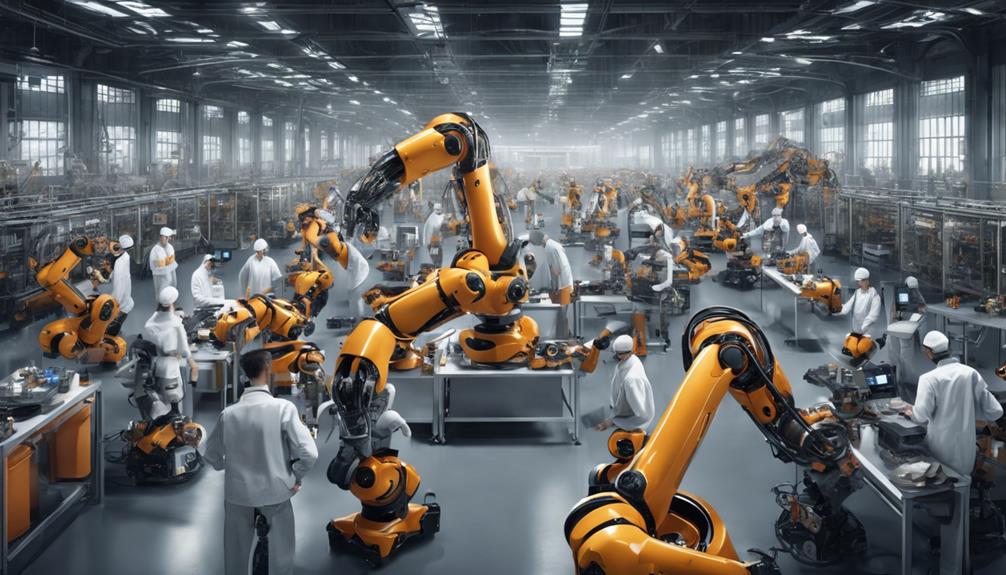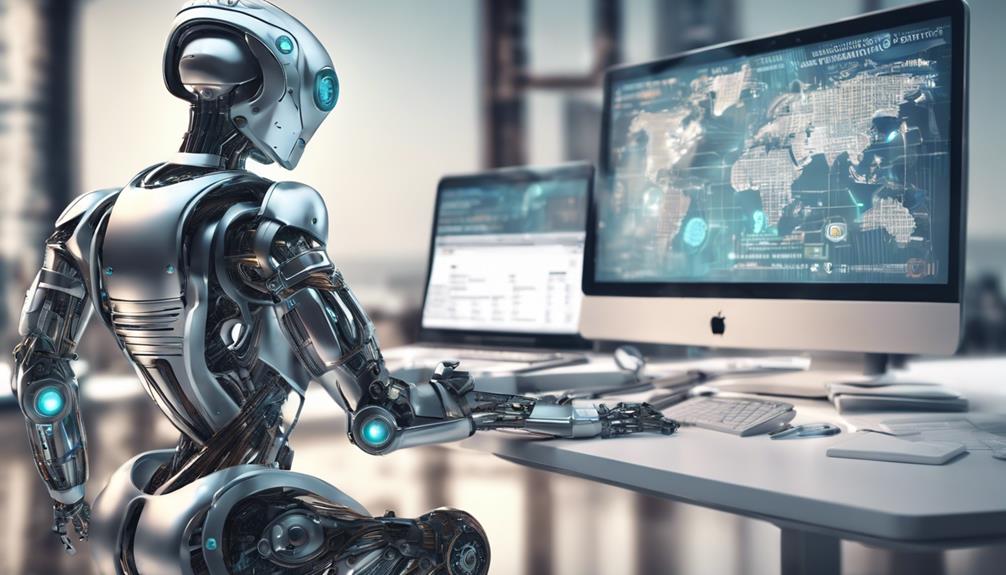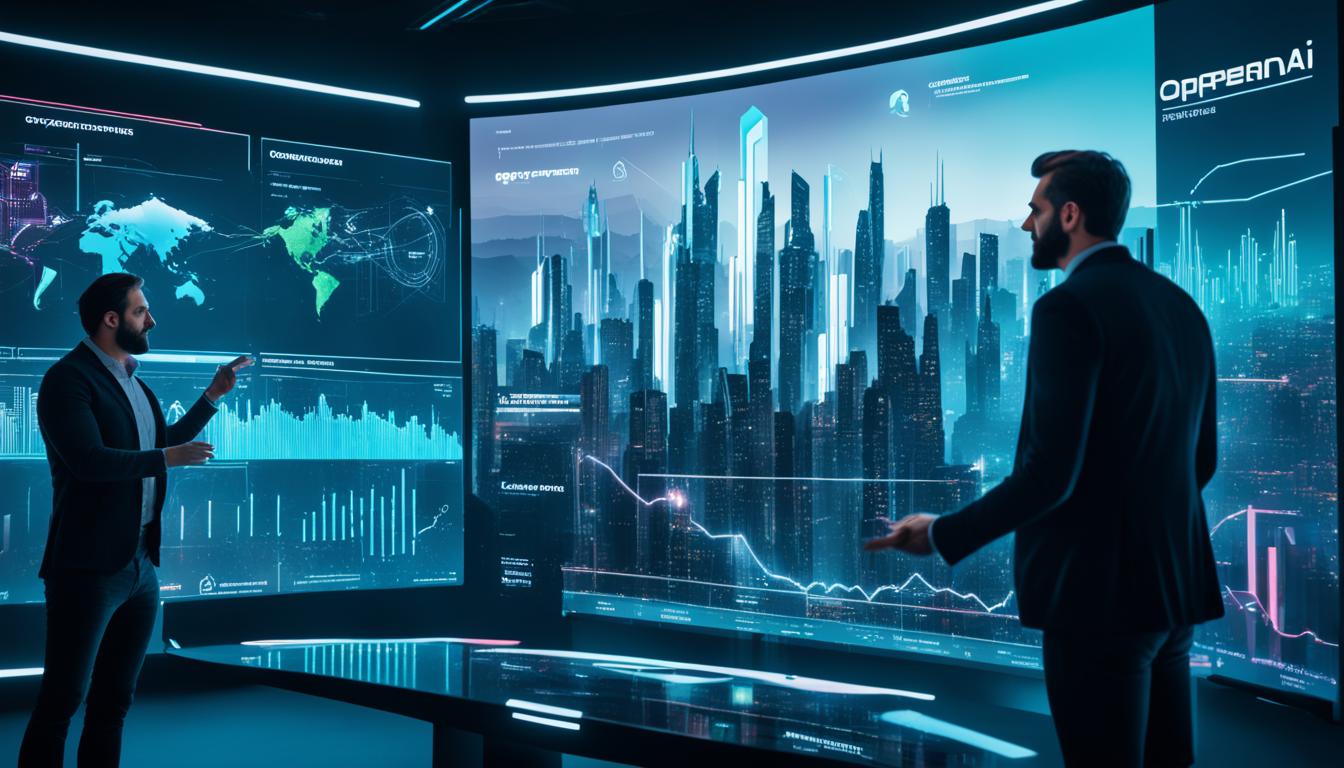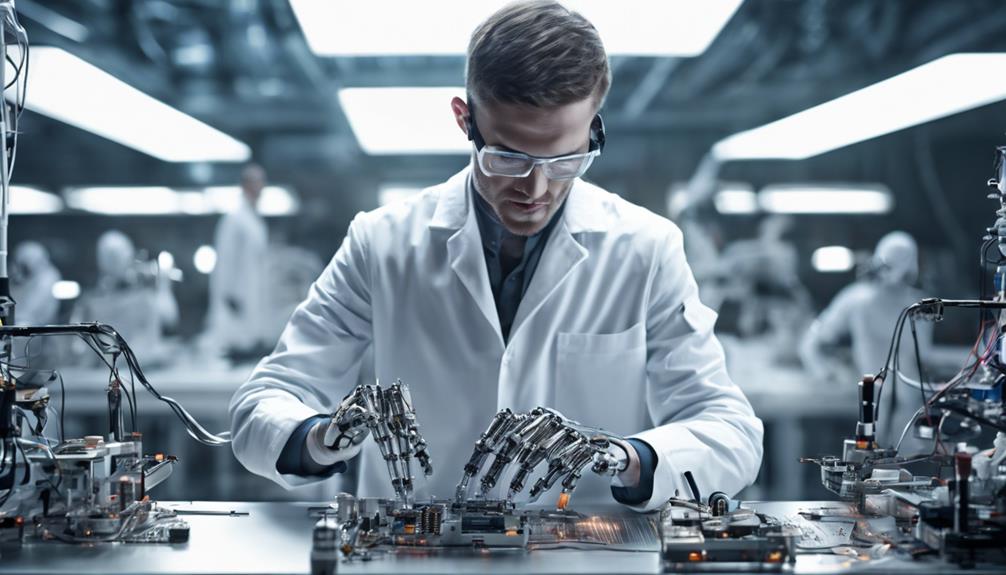As AI continues to revolutionize different industries and reshape job roles, exploring the possibilities of creating jobs in the field of AI is a fascinating subject to explore.
The transformative power of AI extends beyond mere automation to fostering a new wave of specialized positions that require a blend of technical knowledge and human creativity.
By understanding the incremental steps involved in this process, we can unravel the intricate ways in which AI will not only alter existing job markets but also pave the way for the emergence of novel job opportunities.
Key Takeaways
- AI integration generates 97 million new job roles by 2025.
- AI revolutionizes traditional sectors like healthcare and agriculture.
- Entrepreneurs find growth opportunities through AI innovation.
- Cultivating human skills alongside AI is essential for job market success.
The Evolution of AI in Job Markets
The proliferation of artificial intelligence (AI) technologies has catalyzed a transformative shift in the job market landscape, paving the way for substantial changes in job roles and the emergence of innovative opportunities across various industries. AI and machine learning are creating new job roles by complementing human capabilities rather than simply displacing them.
As AI advancements continue, traditional job roles are being reshaped, leading to the creation of diverse positions in sectors such as healthcare, finance, and technology. The integration of AI across industries is predicted to generate approximately 97 million new job roles by 2025, indicating a significant shift in the job market dynamics.
AI contributes to economic growth by fostering innovation and automation, further fueling the demand for skilled professionals in research, development, and marketing. The evolution of AI in job markets is evident through the rising need for AI specialists who can navigate the complexities of technological advancements.
Moreover, the demand for professionals adept at working with AI-driven digital assistants and smart devices highlights the evolving nature of job markets in the digital age.
Redefining Industry Norms With AI

Redefining industry standards through the integration of AI technologies is reshaping operational frameworks and fostering a new era of innovation and efficiency. In healthcare, the implementation of AI has given rise to new roles such as health data analysts, altering traditional industry norms and creating job prospects.
Moreover, in agriculture, AI is revolutionizing crop management, offering opportunities for agrotechnologists to combine their agricultural expertise with AI knowledge, thereby contributing to skill development and job creation within the sector.
The infusion of AI in drug discovery and telemedicine is transforming healthcare practices, reshaping industry norms, and opening doors to new job prospects. Additionally, the utilization of AI to predict weather patterns for enhanced agricultural yields is redefining industry norms in the agricultural sector and fostering job growth.
The convergence of AI with various industries is not only revolutionizing operational processes but also creating avenues for job creation, skill development, and the evolution of industry standards.
AI's Impact on Traditional Sectors
Incorporating AI technologies into traditional sectors like healthcare and agriculture has led to a fundamental shift in operational paradigms and workforce dynamics. AI's impact extends beyond mere automation; it is reshaping job roles by augmenting human skills and streamlining processes. The potential for AI to replace repetitive tasks in these sectors is evident, freeing up human resources for more strategic and creative endeavors.
In healthcare, AI is revolutionizing medical practices, enabling more accurate diagnosis and treatment planning. This transformation has sparked the emergence of new roles such as health data analysts and AI ethics specialists. Similarly, in agriculture, AI is optimizing crop management practices, leading to the creation of opportunities for agrotechnologists who possess a blend of agricultural expertise and AI knowledge.
The integration of AI in traditional sectors is not about replacing humans but about empowering them to focus on higher-value tasks. As AI continues to evolve, these sectors will witness the emergence of novel job roles that require a combination of technical proficiency and domain expertise.
Entrepreneurial Opportunities in AI

Entrepreneurial ventures leveraging AI technologies are poised to revolutionize industries by enabling the creation of innovative solutions and customized services tailored to specific market demands. With the power of AI-based tools, entrepreneurs can now develop unique products and services that cater directly to the needs of consumers. This shift towards personalized solutions is opening up new entrepreneurial opportunities that were previously inaccessible. AI is not only empowering small-business owners to expand their reach through e-commerce platforms but also creating non-traditional job opportunities for individuals entering the entrepreneurial space.
The marriage of entrepreneurship and AI is fostering a climate where businesses can thrive by meeting market needs more effectively. Entrepreneurs are now equipped with the tools and resources to navigate various industries and develop solutions that were once out of reach. The potential for growth and innovation in this space is substantial, providing a promising outlook for those looking to capitalize on entrepreneurial opportunities within the realm of AI.
Nurturing Essential Human Skills
The cultivation of essential human skills stands as a pivotal factor in navigating the evolving landscape of AI integration within various professions. As AI has the potential to replace human repetitive and manual tasks, nurturing skills like problem-solving becomes increasingly crucial. Human-centric skill sets such as creativity, empathy, and critical thinking are irreplaceable assets in professions resistant to automation. To highlight the importance of fostering these skills, consider the following table:
| Human Skills | Professions |
|---|---|
| Creativity | Writing, Design, Marketing |
| Empathy | Counseling, Social Work |
| Problem-solving | Engineering, Research |
In professions like law, medicine, therapy, and management, human judgment and expertise play a fundamental role. AI complements human capabilities by enhancing productivity and efficiency in tasks that require cognitive flexibility. The coexistence of AI and human skills creates a harmonious balance, ensuring that human input remains indispensable in driving innovation and progress across diverse sectors.
Frequently Asked Questions
What Jobs Will Be Created by Ai?
The emergence of AI will introduce novel job roles such as machine learning engineers, AI ethics specialists, and data scientists, reflecting the evolving technological landscape. These positions signify a growing demand for specialized skills in AI-related fields.
Will AI Create or Destroy More Jobs?
AI will create more jobs than it displaces. By 2025, an estimated 97 million new job roles will emerge due to AI integration. Sectors will require a larger maintenance workforce to support technological advancements, fostering economic growth and job diversification.
How Will AI Drive Job Creation?
AI drives job creation by revolutionizing industries, necessitating skilled workers for maintenance, innovation, and optimization. This expansion offers diverse career prospects, as AI's integration fosters efficiency and unlocks new roles across sectors.
What Jobs Will AI Replace by 2030?
By 2030, AI is expected to automate repetitive tasks in manufacturing, customer service, data entry, and administrative roles like clerks. Jobs involving routine manual labor, basic data analysis, and standardized processes are most susceptible to replacement.
Conclusion
In conclusion, as AI continues to evolve and integrate into various industries, it is evident that the technology will create more job opportunities rather than displace workers.
The potential for job creation in specialized AI-related roles is promising, highlighting the need for upskilling and adaptation to the changing job market landscape.
Like a rising tide lifting all boats, AI has the potential to uplift and transform the workforce, leading to a more innovative and dynamic economy.
Ava combines her extensive experience in the press industry with a profound understanding of artificial intelligence to deliver news stories that are not only timely but also deeply informed by the technological undercurrents shaping our world. Her keen eye for the societal impacts of AI innovations enables Press Report to provide nuanced coverage of technology-related developments, highlighting their broader implications for readers.










